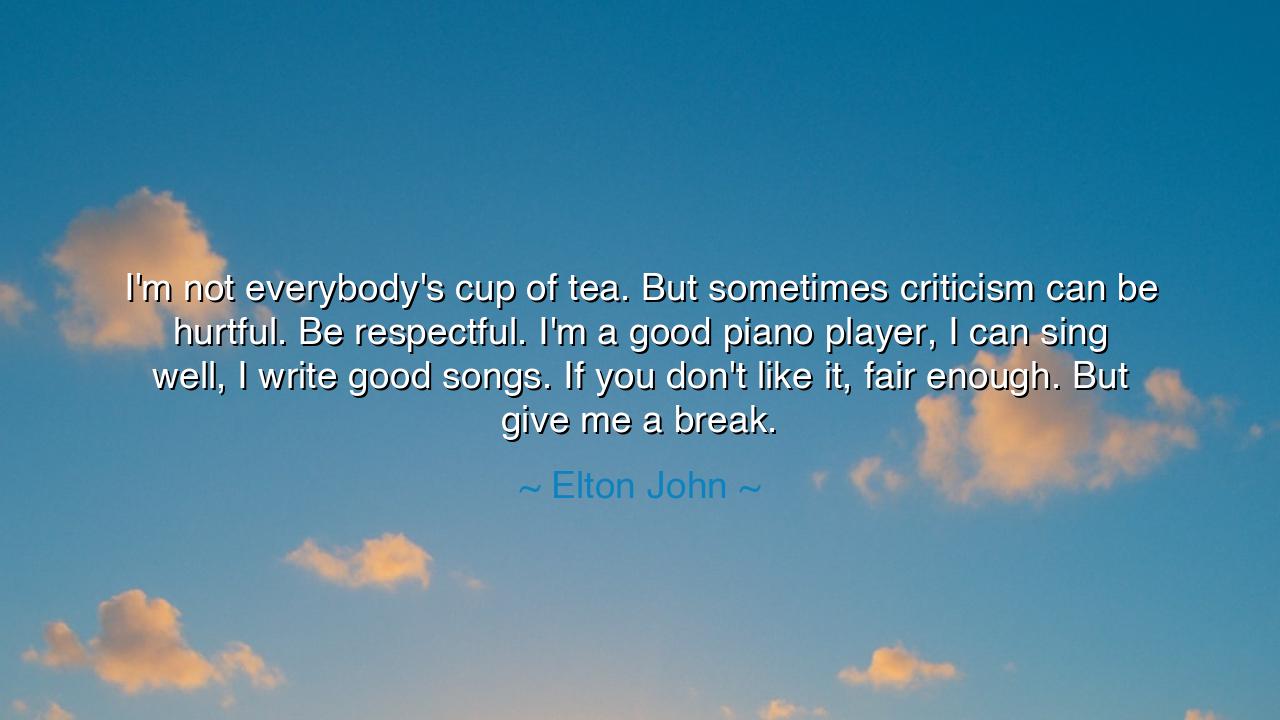
I'm not everybody's cup of tea. But sometimes criticism can be
I'm not everybody's cup of tea. But sometimes criticism can be hurtful. Be respectful. I'm a good piano player, I can sing well, I write good songs. If you don't like it, fair enough. But give me a break.






The words of Elton John, “I’m not everybody’s cup of tea. But sometimes criticism can be hurtful. Be respectful. I’m a good piano player, I can sing well, I write good songs. If you don’t like it, fair enough. But give me a break,” shine with the honesty of one who has walked long upon the stage of life. They are not the cry of weakness, but the declaration of a soul who has offered his gifts to the world and knows both the power of praise and the sting of cruelty. In these words, we hear a timeless truth: that every artist, every human being, is vulnerable beneath the armor of talent, and that respect is the least we owe one another, even when our tastes or judgments diverge.
To say “I’m not everybody’s cup of tea” is to acknowledge a law as old as time: no one pleases all, nor should they try. Each soul carries its own music, its own rhythm, its own fire. Just as not every man delights in the same wine, nor every woman in the same song, so too do our creations stir hearts differently. But Elton’s words remind us that difference of taste must not become cruelty, and that criticism without respect wounds more than it teaches. To speak one’s truth without compassion is to wound needlessly.
The ancients themselves knew the burden of public voice. Consider Socrates, who was condemned not for evil, but for being “not everyone’s cup of tea.” His relentless questioning stirred discomfort; his critics found his manner hurtful, though his intent was wisdom. Yet he accepted their rejection with calm, reminding us that the measure of worth is not the number of those who applaud, but the fidelity to one’s calling. Elton echoes this lesson, standing in the line of those who endure rejection while still affirming their gift.
History also gives us the tale of Vincent van Gogh, whose paintings were dismissed, ridiculed, and even unsold in his lifetime. He was “not everyone’s cup of tea.” Yet today, the same brushstrokes that once invited scorn are revered as masterpieces. What does this reveal? That criticism often blinds itself to truth, and that the treasures of an artist’s soul cannot be measured by the voice of the crowd. Elton’s plea for respect is not weakness, but the cry of every creator who dares to give of themselves in a world quick to wound.
The heart of Elton’s words lies in the call for respect. One may not love his voice, nor his melodies, nor his flamboyant presence, yet one must still honor the effort, the devotion, and the sincerity behind them. To dismiss or belittle is to trample upon a gift offered. To disagree with taste is human; to destroy with cruelty is inhuman. Thus, Elton asks not for universal adoration, but for simple kindness—for the recognition that behind the music stands a man who feels as deeply as the rest of us.
The teaching is clear: in every encounter with art, with speech, with human effort, choose compassion over scorn. Criticism may guide, but it must not crush. Honesty may be spoken, but it must walk hand in hand with empathy. The lesson is not to silence your opinion, but to season it with respect. In this way, we become guardians of one another’s courage, not executioners of it.
Practical actions flow from this. When you encounter work that does not please you, ask yourself: how can I speak truth without cruelty? When you feel the urge to dismiss, remember the human heart that labored behind what you see. Support those who dare to share their gifts, even when those gifts are not for you. And when you are the one criticized, remember Elton’s words: you are not everyone’s cup of tea, but your worth lies not in universal approval, but in the sincerity of your gift.
Thus, Elton John’s declaration rises as a hymn for all who create, all who labor, all who dare to be seen: “Be respectful… I’m a good piano player, I can sing well, I write good songs. If you don’t like it, fair enough. But give me a break.” Let these words remind us that respect is the soil in which courage grows, and without it, even the most gifted may falter. But with it, the song of humanity may flourish, each voice different, yet all worthy of honor.






AAdministratorAdministrator
Welcome, honored guests. Please leave a comment, we will respond soon